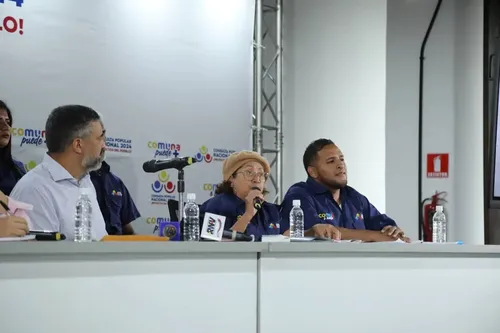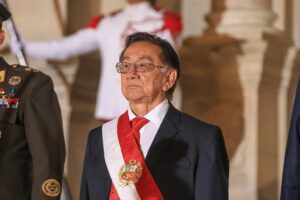
The Venezuelan Ministry of Communes is preparing a public consultation for April 21 to define investment priorities for the country’s communes. Called “Comuna Puede Más”, voting will be done in more than 49 thousand communal councils to select 4,500 projects.
Voters will choose, among 7 options, what the priorities of each commune are. The topics that Venezuelans will have to vote on are: drinking water, electrical services, health system, education, waste management, productive services and street maintenance. Each commune presented projects for these areas that will be chosen by voters. From the vote, each commune will list which projects will be a priority for the government’s execution.
This Tuesday (2), the ministry held a meeting to take stock of the organization of the public consultation. O Brazil in fact accompanied the event. According to the Minister of Communes, Guy Vernaez, the preparation and execution of projects is not something new for communes.
“Other bodies, governments, city halls, carry out this type of consultation and carry out these projects. It’s not something new for the communes, they are already used to doing this type of process. The ones we are dealing with now, particularly, are projects that can be executed quickly”, stated the minister.
The ministry’s idea is that the consultation and project selection process will be carried out regularly from now on by the communities.
The election will have logistical and operational support from the National Electoral Council (CNE). The election tables will be set up on the day and each representative will go to the table to vote. The priority projects will be presented to the government, which will decide which ones will be implemented. The electoral body will set up 13,948 voting centers across the country.
In total, 31,500 projects were prepared across the country for execution. The definition of the projects that will be voted on in each commune was done in communal assemblies, accompanied by governors, mayors, community leaders, social movements and members of the United Socialist Party of Venezuela (PSUV).
The communes will also be responsible for a campaign to encourage the participation of Venezuelans, which will last until April 19. The state of Zulia was responsible for registering the largest number of projects: 2,733. The area that had the highest number of registered projects was drinking water, with 4,701.
According to the minister of communes, public consultation is essential for popular participation in projects that are aimed at the population and, mainly, at the communes.
“The communes feel that they are taking a giant step in exercising participatory democracy and empowering these communities. This is the meaning of the popular consultation. For us it is something to follow a process that is already happening, it was very simple”, said the minister to the Brazil in fact.
For Ofelia García, spokesperson for the Bomboná Community Council, the consultation is not only important because of the investments that will be made, but also to demonstrate the organizational capacity of the communes.
“We have the task of motivating all communities in our municipality, with the support of the CNE, where the people’s ability to organize will be demonstrated, as we did previously with the Federal Government Council”, he said. The Federal Government Council is the body responsible for coordinating policies that transfer some issues that are the responsibility of the federal government to states, municipalities and regional administrations.
What are communes
Communes are a specific type of social and political organization based on urban neighborhoods and rural communities. Created from the Organic Law of Communes, promulgated in 2010 by then president Hugo Chávez, they are experiences of a new form of social organization based on self-management and with permanent dialogue with the State.
They even have priority in the transfer of resources and do not need to be restricted to one State or municipality, that is: the same commune can cover more than one city.
The role of the commune also involves the economic administration of resources. These organizations also have an exercise which is the law of communal economy, which recognizes four types of organization at an economic level: companies of direct communal social property, family production units, exchange groups or companies of indirect communal social property, which are mixed companies with half managed by the State and half by the commune.
Editing: Leandro Melito

Source: www.brasildefato.com.br

